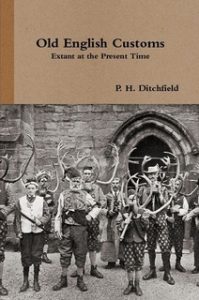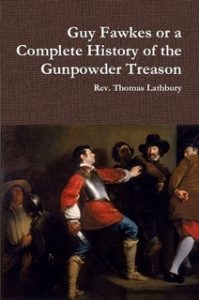
Our historical customs, or customs which owe their origin to events in the history of our country, are not very numerous. Besides Royal Oak Day, which has already been described, we have the famous commemoration of the discovery of Gunpowder Plot on November 5th. This is a very popular festival, when bonfires are lighted everywhere, and “guys” — a perpetual memorial of the famous Guy Fawkes— are burnt with much accompaniment of squibs and crackers.
Probably few of those who take part in these functions recall to mind that November 5th was instituted by the House of Commons as “a holiday for ever in thankfulness to God for our deliverance and detestation of the Papists;” but this ignorance does not prevent them from keeping up the custom and enjoying the excitement of the bonfire and fireworks.
The usual rhyme which the youths repeat when they carry round the guy and collect fuel for their bonfires or largess for themselves is as follows: —
“Please to remember the Fifth of November,
Gunpowder treason and plot;
I see no reason why gunpowder treason
Should ever be forgot”
A common variation of the last two lines is —
“When the king and his train had nearly been slain,
Therefore it shall not be forgot”
The Berkshire boys used to add the words: —
“Our king’s a valiant soldier
With his blunderbuss on his shoulder;
Cocks his pistol, draws his rapier;
Pray give us something for his sake here.
A stick and a stake, for our good king’s sake. I
f you won’t give one, I’ll take two;
The better for me, the worse for you.
Chorus —
Holloa, boys, holloa, boys, make the bells ring;
Holloa, boys, holloa, boys, God save the Queen.”
“King” is evidently the correct rhyme for “ring” but on the accession of her Majesty Queen Victoria the correctness of the poetry was sacrificed to the appropriateness of the address to the reigning sovereign. Some of the rhymes tell us of the nefarious deeds of wicked Guy Fawkes, and the following, we believe, is still extant: —
“Guy Fawkes and his companions did contrive
To blow the House of Parliament up alive
With threescore barrels of powder down below,
To prove Old England’s wicked overthrow;
But by God’s mercy all of them got catched,
With their dark lantern and their lighted match.
Ladies and gentlemen sitting by the fire,
Please put hands in pockets and give us our desire;
While you can drink one glass, we can drink two,
The better for we, and none the worse for you.”
Riunour, rumour, pump a derry,
Prick his heart and burn his body.
And send his soul to Purgatory.”
From Beckley, Oxon, we have the following rhyme, which is still said by the youths when collecting wood for their fire: —
“Don’t you know ’tis the Fifth of November,
Gunpowder Plot? We’ve come to beg
A stick or a stake.
For King George’s sake.
If you don’t give us one.
We’ll take two;
Then ricket a racket,
Your door shall go.”
At Headington, in the same county, the boys sing the following verses: —
“Remember, remember,
The Fifth of November,
Bonfire night;
We want a faggot
To make it alight
Hatchets and duckets.
Beetles and wedges,
If you don’t give us some
We’ll pull your old hedges;
If you don’t give us one.
We’ll take two;
The better for us.
And the worse for you.”
A slight menace is very common in these Gunpowder Plot ditties. At several places at the present time it is customary to celebrate Guy Fawkes Day with much elaborate ceremonial, torchlight processions, composed of people in very fancy dress costume. The display of fireworks in many towns is very grand and elaborate. At Hampstead very elaborate preparations are made; several bonfire clubs combine in making the display effective, and the procession is usually very picturesque and imposing. One car at the last celebration, representing the British Isles and the Colonies, with attendant beefeaters and pages, was sent by Sir Augustus Harris.
On the South Coast these observances are usual in several towns. At Rye the “Borough Bonfire Boys” organise a procession, light bonfires, and burn effigies. At Folkstone the procession consists of carts and waggons, gaily decorated, and containing tableaux vivants, contributed by the Friendly Society. The Ancient Order of Druids send a party representing the Ancient Britons. A blacksmith’s forge, a butcher’s car, fire brigades, and other shows, make up the procession, and torches and Chinese lanterns, and bands of music, add brightness to the festival. At Marylebone and Bermondsey the bonfire clubs are much in evidence. Political guys are not unknown, and at the last occasion the Sultan of Turkey thrashing a poor Armenian was one of the representations. In the old Middlesex suburban town of Enfield a huge fancy-dress procession is formed on the evening of Guy Fawkes Day; thousands of people throng the streets, and fires of all colours blaze along the line of route. Groups allegorical of local traditions associated with the old Enfield chase, Colonel Somerset’s stag-hounds, the Herts Yeomanry, fire brigades, and schools, form interesting features in the long procession. Money is collected for the Cottage Hospital, and a monster bonfire is lighted on the green and the traditional guy burned.
The almost universal observance of the day, and the similarity of the modes of commemorating the discovery of the Gunpowder Plot, obviate the necessity of recording the manners and customs of the English people on this occasion.
Extract from Old English Customs Extant at the Present Time – P. H. Ditchfield, M.A., F.S.A. (1896)






